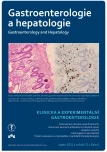-
Medical journals
- Career
The effect of CDED diet on the development of remission in a patient with persistent Crohn’s disease activity – a case report and workplace experience
Authors: Matušinská K. 1; Pipek- B. 1 3; Fialová A. 4; Fojtík P. 1,3
Authors‘ workplace: Centrum péče o zažívací trakt, Nemocnice AGEL Ostrava-Vítkovice a. s., Ostrava 1; II. interní klinika – gastroenterologická a geriatrická LF UP a FN Olomouc 2; Lékařská fakulta Ostravské univerzity, Ostrava 3; Oddělení nutriční péče, Nemocnice AGEL Ostrava-Vítkovice a. s., Ostrava 4
Published in: Gastroent Hepatol 2021; 75(4): 345-349
Category:
doi: https://doi.org/10.48095/ccgh2021345Overview
The CDED diet (Crohn‘s disease exclusion diet) is the first elimination diet that induces and maintains remission in adult patients with mild to moderate Crohn‘s disease. It is based on mandatory, recommended and prohibited foods. In our article we present our workplace experience, that is still limited, as well as the case report of a patient with a long history of Crohn‘s disease in ileocecal localization on immunosuppressive therapy with azathioprine. He has benefited significantly from the CDED diet, his abdominal symptomatology and laboratory parameters have improved. There has also been a significant improvement in the quality of his life.
Keywords:
CDED – Crohn’s disease – Diet – alternative nutrition – relapse of the disease
Sources
1. Zbořil V et al. Idiopatické střevní záněty. Praha: Mladá fronta 2018.
2. Lukáš M et al. Idiopatické střevní záněty. Nové trendy a mezioborové souvislosti. Praha: Grada Publishing 2020.
3. Sommer F, Rühlemann MC, Bang C et al. Microbiomarkers in inflammatory bowel disease. Gut 2017; 67 (9): 734–1738. doi: 10.1136/gutjnl - 2016-313678.
4. Lababidi N. Aktuální vědecké podklady pro dietu pro Crohnovu chorobu založenou na vyloučení některých potravin (CDED). Gastroent Hepatol 2020; 74 (3): 240–245. doi: 10.14735/ amgh2020240.
5. Bronský J, Frühauf P, Hradský O et al. Stanovisko Pracovní skupiny pro dětskou gastroenterologii, hepatologii a výživu České pediatrické společnosti (PSDG ČPS) k používání dietních opatření v léčbě Crohnovy nemoci u dětských pacientů. Gastoent Hepatol 2019; 73 (6): 472–476. doi: 10.14735/amgh2019472
6. Mitrová K. Dieta CDED v indukční fázi Crohnovy choroby. Gastroent Hepatol 2019; 73 (6): 476–480. doi: 10.14735/amgh2019476.
7. Sigall Boneh R, Pfeffer-Gik T, Segal I et al. Partial enteral nutrition with a Crohn’s disease exclusion diet is effective for induction of remission in children and young adults with Crohn’s disease. Inflamm Bowel Dis 2014; 20 (8): 1353–1360. doi: 10.1097/MIB.0000000000000110.
8. Sigall Boneh R, Sarbagili Shabat C, Yanai H et al. Dietary therapy with the Crohn’s disease exclusion diet is a successful strategy for induction of remission in children and adults failing biological therapy. J Crohns Colitis 2017; 11 (10): 1205–1212. doi: 10.1093/ecco-jcc/jjx071.
9. Levine A, Wine E, Assa A et al. Crohn’s disease exclusion diet plus partial enteral nutrition induces sustained remission in a randomized controlled trial. Gastroenterology 2019; 157 (2): 440–450. doi: 10.1053/j.gastro.2019.04.021.
Labels
Paediatric gastroenterology Gastroenterology and hepatology Surgery
Article was published inGastroenterology and Hepatology

2021 Issue 4-
All articles in this issue
- Clinical and experimental gastroenterology
- Kvíz z klinické praxe
- SARS-CoV-2 infection and pancreatic disease
- Parkinson‘s disease and GIT involvement
- Heyde’s syndrome
- CMV enteritis as unusual source of bleeding to GIT
- The impact of sarcopenia and myosteatosis in liver transplant candidates on peritransplant course and patient and graft survival
- Endoscopic management of ampullary tumors: European Society of Gastrointestinal Endoscopy (ESGE) Guideline and Endoscopic management of superficial nonampullary duodenal tumors: European Society of Gastrointestinal Endoscopy (ESGE) Guideline
- An unusual case of systemic AA amyloidosis
- Vitamin D and non-alcoholic fatty liver disease in children
- The effect of CDED diet on the development of remission in a patient with persistent Crohn’s disease activity – a case report and workplace experience
- News from the EASL-ILC congress: advances in the knowledge and treatment of primary biliary cholangitis
- The selection from international journals
- Správná odpověď na předchozí kvíz Dlouhodobé bolesti břicha
- Kreditovaný autodidaktický test: klinická a experimentální gastroenterologie
- Serum anti-laminarin antibodies in colorectal cancer: a prospective pilot study
- Gastroenterology and Hepatology
- Journal archive
- Current issue
- Online only
- About the journal
Most read in this issue- Heyde’s syndrome
- SARS-CoV-2 infection and pancreatic disease
- The effect of CDED diet on the development of remission in a patient with persistent Crohn’s disease activity – a case report and workplace experience
- Vitamin D and non-alcoholic fatty liver disease in children
Login#ADS_BOTTOM_SCRIPTS#Forgotten passwordEnter the email address that you registered with. We will send you instructions on how to set a new password.
- Career

